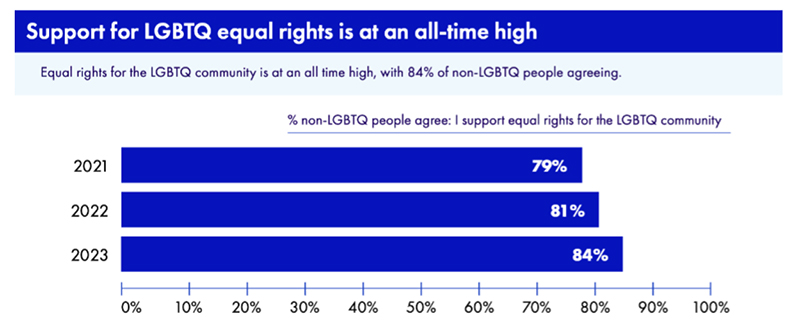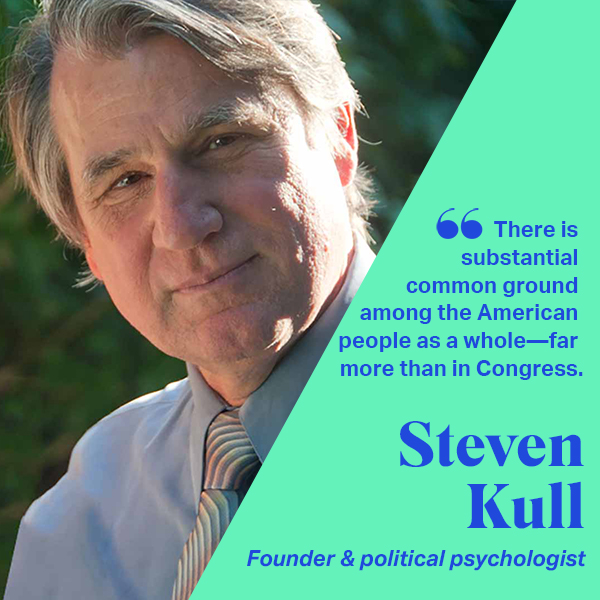Volcanoes are erupting in The Philippines, but on-fire Australia received some welcome rain. The Iran war cries have been called off and The Donald’s military powers are about to be hamstrung by the Senate. Meanwhile, his impeachment trial is starting, and we’re all on Twitter for a front-row seat.
What Could Go Right? Pouring water on the culture war flames 🏳️🌈
Supermajorities in the US support LGBTQ rights, and acceptance is growing quickly worldwide.
This is our weekly newsletter, What Could Go Right? Sign up here to receive it in your inbox every Thursday at 6am ET. You can read past issues here.
Supermajority support
From a culture wars perspective, Pride Month in the United States is off to an exhausting start. This video of protestors brawling in Glendale, California, where the school board is voting on whether to recognize Pride Month, has been viewed millions of times. Media coverage and online discourse over boycotts of pro-Pride companies continue.
In all the tumult, it’s easy to lose sight of one simple fact: LGBTQ acceptance is very high in the US. It’s also growing globally, and quickly at that. According to a 2022 Gallup poll, the share of people worldwide who say their area is a good place for gay or lesbian people to live doubled from 25 to 50 percent since 2012.

Even in historically conservative countries like South Korea, Japan, and Romania, there is movement toward legalizing same-sex unions, although it progresses in fits and starts.
A new study from GLAAD, an advocacy organization, released last month backs up the slightly older Gallup figures for the US, with the percentage of non-LGBTQ Americans who support equal rights for the LGBTQ community moving ever upward the past three years:

An additional 91 percent agree that LGBTQ people should have the freedom to live their life and not be discriminated against.
Those are the basics. There are many other numbers in the study, including, interestingly, that 70 percent of non-LGBTQ adults agree that companies should publicly support the LGBTQ community through hiring practices, advertising, and/or sponsorships.
Those boycotting Target and other companies receive a lot of attention but are actually small in number. As The Progress Network (TPN) Member Isaac Saul wrote in his recent newsletter on the topic, “The extreme views are taking up all the oxygen, and making us think the other side is a lot crazier than they really are.” A Glendale brawl does not a national picture make.
Until the Pride Month brouhaha this month, most of the culture war focus has been less on the “traditional” issue of gay rights and more on questions around transgender issues. Majorities of Americans support laws opposing the discrimination of trans people, according to a Washington Post-KFF poll. Majorities also support gender-affirming counseling for youth and teens, but oppose medication for them, where much of the current debate and legislative action lie.
Human Rights Campaign (HRC) has tracked 520 bills introduced in state legislatures in 2023 that they call anti-LGBTQ. Of those, per HRC, 20 of them have been passed or are about to be passed. They are difficult to summarize succinctly. Four have to do with banning surgeries or medications for trans youth (five if you count Florida’s criminalization of doctors providing transition-related care for patients of all ages), which makes 18 states total where trans youth care is banned. Three prohibit discussion of LGBTQ-related topics in elementary and middle schools. The others vary.
The large difference in number between bills introduced and passed—although more may pass in the future—suggests that outside of the youth care question, there is a good amount of posturing going on. This has not escaped Americans’ attention. Seventy-two percent of Democrats, 65 percent of Independents, and 55 percent of Republicans agreed with the statement, referring to the 400-odd bills that had been introduced by March 2023, that “This is too much legislation. Politicians are playing political theater and using these bills as a wedge issue.” This is from a survey of likely voters conducted by Data for Progress.
All these numbers also cast a state like Florida, which has enacted legislation aimed at trans adults, in a special light.
Which is to say, the day’s hot-button issues center around youth care and sports participation. Without delving into either of those debates, I will simply say that they are sensitive ones, and Americans are in the thick of them now. When it comes to Pride Month, however, where Americans stand as a whole is much more basic: in agreement.
P.S. There are several exciting items about cancer treatment advances that I have held for next week due to space reasons. Stay tuned.
Quick hits
Two new climate solutions just dropped: “enhanced rock weathering” and fungi. The latter, one study showed, store over a third of carbon from fossil fuel emissions and “represent a blind spot in carbon modeling, conservation, and restoration,” said the study’s coauthor.
Colorado banned ghost guns, which are guns and gun parts that are unserialized and cannot be tracked. New York is considering criminalizing printing them at home. One method of manufacturing ghost guns is to print them using a 3D printer.
Below in the links section, vulture surveillance systems, public health vending machines, cat contraception, and more.

A Better World | S4 E17

Did anyone “win” the debt ceiling debate? Where is the economy headed, long term? And what breakthroughs can be used to build a better world? James Pethokoukis, a senior fellow at the American Enterprise Institute, where he specializes in US economic policy, joins us to share his perspective on a brighter future. Plus, bacteria-fighting AI and tracking social progress. | Listen to the episode
Progress, Please
(Found good news? Tweet at us @progressntwrk or email.)
Other good stuff in the news 🐱
Energy & Environment:
- First steps agreed on plastics treaty after breakthrough at Paris talks | The Guardian
- Renewable power on course to shatter more records as countries around the world speed up deployment | IEA
- Butterfly species back in England after almost 100 years | The Guardian
- Vulture surveillance system alerts Zambian park to poisonings | Reuters
- Underwater creatures: 5,000 new species found in the Pacific Ocean | BBC
- India pauses plans to add new coal plants for five years, bets on renewables, batteries | AP
- Emissions are no longer following the worst case scenario | The Climate Brink
Public Health:
- Eradicate breast cancer? The hunt for a vaccine looks promising | Bloomberg
- FDA proposes easy-to-read drug package inserts | Axios
- FDA approves Pfizer RSV vaccine for older adults | CNBC
- Pfizer says its experimental antibiotic combo can treat some superbug infections | Reuters
- Vending machine providing free birth control and overdose prevention products debuts in Brooklyn | Gothamist
- Japan vending machines to automatically offer free food if earthquake hits | The Guardian
- States take matters into their own hands to ban ‘forever chemicals’ | The Washington Post
- LGBTQ health coverage improved after same-sex marriage ruling | Axios
Science & Tech:
- Chemists can now move single atoms in and out of a molecule’s core | Nature
- Sweater-wrapped robots can feel and react to human touch | Carnegie Mellon University
- New airborne radar could revolutionize hurricane forecasting | Axios
- One-off injection may provide lifetime contraception for female cats | New Scientist
- Philippines scientists develop climate-resistant rice | Reuters
- US announces $46 million in funds to nuclear fusion companies | Reuters
Politics & Policy:
- Argentina allows morning-after pill to be bought over counter | BBC
- Minnesota becomes 23rd state to legalize recreational marijuana | Duluth News Tribune
- AR pistols must now be registered: Understanding the ATF rule on short-barreled rifles | The Dallas Morning News
- Texas CROWN Act signed into law prohibiting hair discrimination based on race | KBTX
- Somalia to introduce direct universal suffrage in 2024 | France 24
- Will Pakistan’s maternity leave law be implemented? | DW
Society & Culture:
- Mississippi is offering lessons for America on education | The New York Times
- Latvia elects the first openly gay head of state in Europe | PinkNews
Economy:
- American cities are starting to thrive again. Just not near office buildings. | The Wall Street Journal
- Semi-retirees know the key to work-life balance | The Atlantic
- Australia’s lowest-paid workers to get 5.75% increase in minimum wage | The Guardian
- US economy adds 339K jobs in May, blowing past expectations | The Hill
TPN Member originals 🧠
(Who are our Members? Get to know them.)
- Talk to strangers. It’s how we build and sustain our democracy | Eboo Patel
- The Supreme Court’s Clean Water Act decision | Isaac Saul
- RFK Jr. is running against Biden | Isaac Saul
- How to prevent the next refugee crisis | Faisal Saeed Al Mutar
- No, the US didn’t ‘provoke’ the war in Ukraine | Ian Bremmer
- Let’s smash the college admissions process | David Brooks
- Don’t avoid romance | Arthur C. Brooks
- How pride becomes the norm | Penny Abeywardena
- What Ozempic reveals about desire | Maia Szalavitz
- Say yes to friendships and relationships | Scott Galloway
- Why Erdoğan won | Yascha Mounk
- The case for phone-free schools | Jonathan Haidt
- From Tel Aviv to Riyadh | Thomas L. Friedman
- The Chinese government tried to obliterate the memory of Tiananmen Square | Ruth Ben-Ghiat
- What I’ve been reading, June 2023 | Jason Crawford
Department of Ideas 💡
(A staff recommendation guaranteed to give your brain some food for thought.)
The Murder Rate Is Suddenly Falling | The Atlantic
The first five months of 2023 have produced an encouraging overall trend for the first time in years.
Why we picked it: If you were in the camp that said that the murder rate spiking had to do with pandemic-era weirdness, data is now coming out to support that theory. We’re still seeing rates in big cities above those of 2019, but we’re going in the right direction. —Emma Varvaloucas
New Member Alert

Steven Kull is a political psychologist and the founder and president of Voice of the People (VOP), a nonpartisan organization working to improve democracy by giving people a greater and more effective voice in government. He is also the Director of the Program for Public Consultation, part of the School of Public Policy at the University of Maryland.
Until Next Time
From automobiles to satellites to email, revel in this list of 50 inventions across a lifetime of 88 years. 🛰️



[…] trans athletes and pronouns, supermajorities in the U.S. support LGBTQ rights (CT Mirror, Gallup, Progress Network). Some mainstream national outlets are depicting both the positive and negative trends around LGBTQ […]